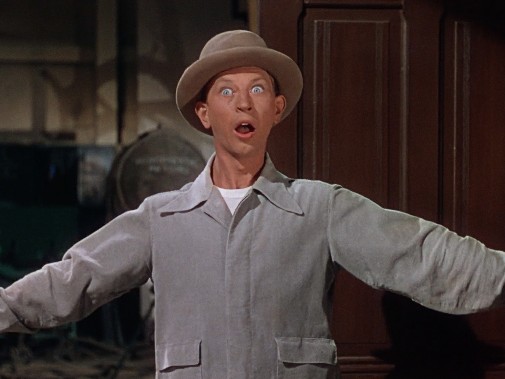
Reader James Lovelace requested that the 'Almost There' series would examine more films from Hollywood's Golden Era. Indeed, along with his request, he sent a list of pre-1970 suggestions, including the one featured today. Looking away from more recent Oscar snubs, let's start August by considering one of the 1950s' best and most joyous musicals. Though nowadays Singin' in the Rain is often cited as a pinnacle of its genre, back in the day, AMPAS and the public weren't nearly as effusive. The picture was only a modest hit and only scored two Oscar nominations – for its music and Jean Hagen's iconic performance as Lina Lamont.
In a just world, other actors from the classic would have joined Hagen on Oscar night. Chief among them, we have Donald O'Connor, a vaudevillian veteran turned musical movie star…
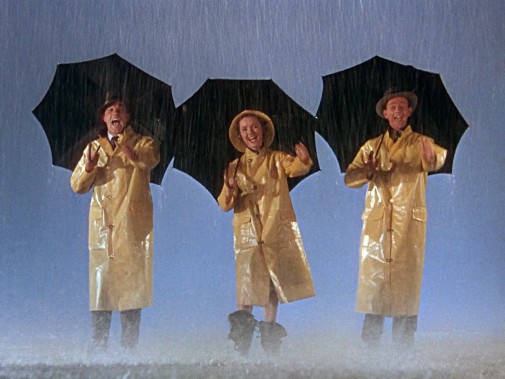
Donald O'Connor plays Cosmo Brown, the best friend of Don Lockwood (Gene Kelly), a former stuntman who graduated to the big leagues and is now a swashbuckling matinée idol at the end of the silent era. Our first glimpse of the character occurs in the picture's mini-overture, soaked in Rain and shining with happy smiles. However, his proper introduction is less flattering. It happens as the viewer is welcomed into the late 20s Tinsel Town setting by the mechanism of a glitzy premiere, narrated in breathless wonder by a Louella Parsons parody. As different starlets walk the red carpet, the crowds go wild, but when it's time for Cosmo's entrance, he's met with silence.
As it happens, he's not one who makes his living in front of the cameras, so his face isn't known to the world. Instead, he's a devoted supporting act to Don, playing piano on set to set the mood for love scenes and the like. While O'Connor plays notes of discomfort during the red carpet ordeal, there's a level of contentment in his ancillary role. When his pal takes the narrative's reigns, retelling his star origins to the adoring public, whatever gradations of annoyance there might have been quickly dissipated. Moreover, one gets to glimpse the not-so-idealized flashbacks of the pair's backstory, where O'Connor revives his vaudeville antics for the big screen.
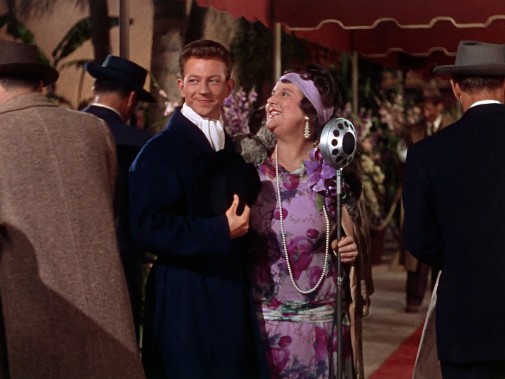
His body is always taut, always moving, each gesture precise and informed by a constant current of energized showmanship. As for his face, that thing's a marvel of mugging with bright eyes and an elastic mouth, like the plastic precedent to our modern Jim Carrey-types. That quality shows up in scenes when O'Connor isn't nearly as central, like backstage listening to Lina's diva nonsense. He's always in the corner, providing sardonic reactions to the narrative's absurdities from the edges of every frame and crowded composition. When that rabble walks away, leaving only Cosmo and Don, the clownishness becomes louder and more overt in its purpose.
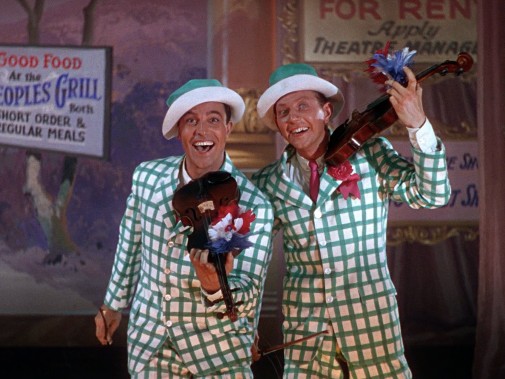
In essence, Donald O'Connor is Singin' in the Rain's court jester, weaponizing every misfortune and personal gripe to make his best pal laugh and, by consequence, the movie's audience. He's the platonic ideal of comic relief, the archetypical clown performed with just enough prickly character specificity – a dash of irritation, a hint of jealousy, a lot of schadenfreude at Lina’s downfall – to avoid losing his humanity. The whole thing's a feat of tonal balance for the ages, apparently simple but deeply challenging. Don't believe it? Go back, watch more Old Hollywood flicks, and see how wrong this sort of subordinate slapstick can go. Hell, even masters like John Ford regularly feel on their faces when it came to these humorous miscalculations.
Part of Singin' in the Rain's genius comes from the way it makes these cinematic tropes part of its dramaturgical gambit, commenting on them within the frame of a movie about moviemaking. This reaches its zenith when Don is feeling especially glum because of some criticism from Debbie Reynolds' Kathy and the dawn of talkies. In other words, he's in desperate need of some cheer. Enter O'Connor's Cosmo in a vaudevillian showstopper to end all showstoppers, the best Hollywood argument for the importance of comedy this side of Sullivan's Travel, and the greatest showcase this particular performer could ever have.
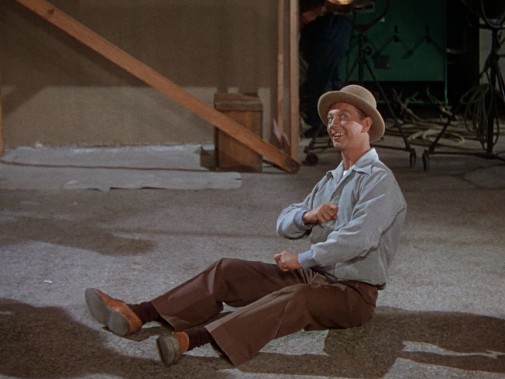
Rearranged from The Pirate's "Be a Clown" and formulated as a way to highlight the actor's trademark gags, "Make 'Em Laugh" is a monumentally demanding number, combining every trick in O'Connor's arsenal. It all starts innocently enough with some piano-playing shenanigans. Soon enough, however, the actor is propelled into a complex choreography where every inch of his body is precisely calibrated to elicit laughs, like some flawlessly engineered entertainment machine. The song lasts around four minutes, with each second depending on a different technical virtuosity, from the ability to turn one's face into a flexible mask to the sort of out-of-control physicality that can only be achieved with the highest level of physical control.
It shouldn't be surprising that such a taxing number would run O'Connor into the ground. At the time of the shooting, he was a heavy smoker, and some of the acrobatic tricks proved calamitous to his health. He reportedly ended up in a hospital bed for three days after completing the number on the harsh concrete floor and burning carpet. Still, according to the actor, he had to do it again once he was back on his feet, thanks to an unforeseen accident with the original footage. If only that had been the only difficulty during the shoot, mayhap O'Connor wouldn't remember the movie with such bitterness as he does. Psychological pressures proved worse than bodily ones.
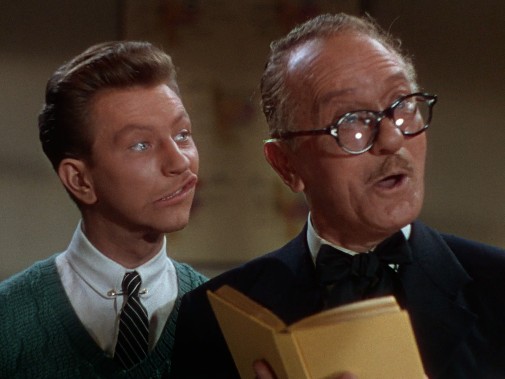
While playing besties for the cameras, O'Connor and Kelly didn't get along. In fact, few people have nice things to say about the picture's director and leading man. Instead, he's often described as a tyrant on set whose perfectionism made life miserable for everyone else. Kelly's on-screen friend was especially victimized by his yelling and verbal abuse. In part, this happened to spare 19-year-old Debbie Reynolds, who cried multiple times during the production and couldn't handle the tongue lashings quite as well as O'Connor. Thankfully, none of that tension bleeds into the final picture, where the union between Don and Cosmo is as steadfast as their dancing synchronicity.
Look no further than the iconic "Moses Supposes" number, the two old-time companions turned back into kids in their rebellious antics against a vocal coach. Then, after a disastrous preview puts everyone in a funk, Kelly, O'Connor, and Reynolds give it their all with "Good Morning." It's in the aftermath of that matinal dance that an idea occurs to Cosmo, who figures out how to save their rotten talkie – turn it into a musical! Furthermore, since Lina sounds like a chirping chipmunk, they'll dub her with another's voice. Watching O'Connor lip sync to Kathy's singing, it's obvious he'd be an assassin if Drag Race had been around in the 1950s. But, like the man's deserved nod, such things only exist in the land of dreams.
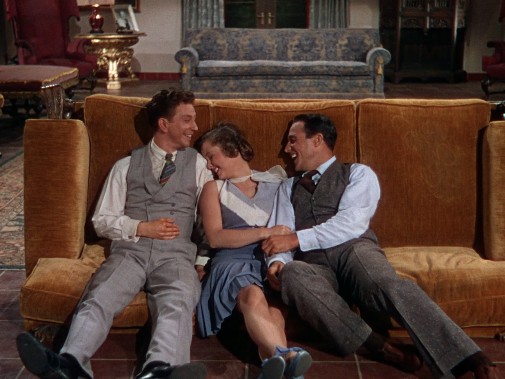
When talking about O'Connor's lack of Oscar nomination, one must mention the matter of category confusion. While sizeable, Cosmo Brown is a decidedly supporting presence in Singin' in the Rain. Despite that, the actor got top billing alongside Gene Kelly and Debbie Reynolds. This is evident in both the picture's credits and its promotional material. Unfortunately, such star treatment meant many would consider O'Connor eligible for lead acting plaudits rather than supporting prizes. At the Golden Globes, for example, he was nominated for Best Actor in a Comedy or Musical against evident leading actors. Despite this, O'Connor won the trophy.
He wouldn't be as lucky when it came to securing the Academy's favor. For the Best Actor category, AMPAS selected Marlon Brando in Viva Zapata!, Gary Cooper in High Noon, Kirk Douglas in The Bad and the Beautiful, José Ferrer in Moulin Rouge, and Alec Guinness in The Lavender Hill Mob. As for the Best Supporting Actor lineup, the nominees were Richard Burton in My Cousin Rachel, Arthur Hunnicutt in The Big Sky, Victor McLaglen in The Quiet Man, Jack Palance in Sudden Fear, and Anthony Quinn in Viva Zapata!. On Oscar night, Cooper and Quinn took home the much-coveted little golden men. Sadly, Donald O'Connor never got another showcase quite as spectacular or buzzy as Singin' in the Rain. He was never nominated for the Academy Awards.
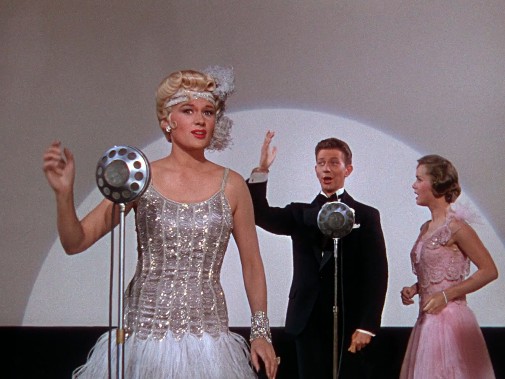
Singin' in the Rain is streaming on HBO Max. You can also rent the movie on many other platforms.